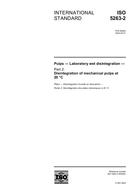We need your consent to use the individual data so that you can see information about your interests, among other things. Click "OK" to give your consent.

ISO 5263-2:2004
Pulps — Laboratory wet disintegration — Part 2: Disintegration of mechanical pulps at 20 degrees C
Automatically translated name:
Pulps -- Laboratory wet disintegration -- Part 2: Disintegration of mechanical pulps at 20 degrees C
STANDARD published on 7.9.2004
The information about the standard:
Designation standards: ISO 5263-2:2004
Publication date standards: 7.9.2004
SKU: NS-432799
The number of pages: 6
Approximate weight : 18 g (0.04 lbs)
Country: International technical standard
Category: Technical standards ISO
The category - similar standards:
Annotation of standard text ISO 5263-2:2004 :
Description / Abstract: ISO 5263-2:2004 specifies an apparatus and the procedures for the laboratory-wet disintegration of mechanical pulps that do not exhibit latency or pulps where latency has already been removed. This apparatus and procedure are required for preparation of the test portion in a number of other International Standards dealing with pulps. In principle, this method is applicable to all kind of mechanical pulps (i.e. mechanical, semi-chemical and chemo-mechanical pulps) that do not exhibit latency, including recovered fibres from mechanical pulps. It is not suitable for mechanical pulps exhibiting latency for which the disintegration procedure described in ISO 5263-3 shall be used. The procedure specified by ISO 5263-2:2004 should also be used to disintegrate all mechanical pulps to be measured for brightness.
We recommend:
Technical standards updating
Do you want to make sure you use only the valid technical standards?
We can offer you a solution which will provide you a monthly overview concerning the updating of standards which you use.
Would you like to know more? Look at this page.



 Cookies
Cookies
